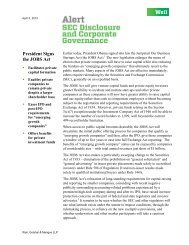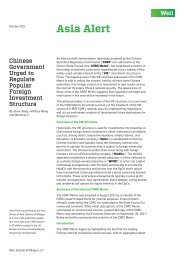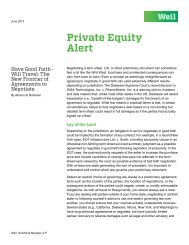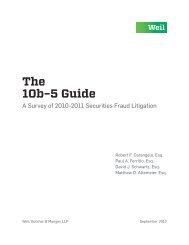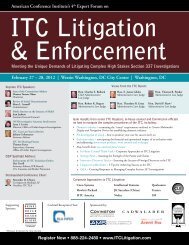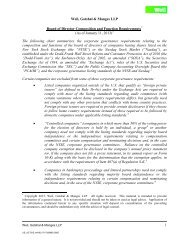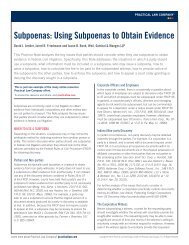international comparison of corporate governance guidelines and ...
international comparison of corporate governance guidelines and ...
international comparison of corporate governance guidelines and ...
Create successful ePaper yourself
Turn your PDF publications into a flip-book with our unique Google optimized e-Paper software.
OECD Principles/Millstein Report<br />
(International)<br />
CVM Recommendations<br />
(Brazil)<br />
IBGC Code<br />
(Brazil)<br />
Confecámaras Code<br />
(Colombia)<br />
CCE/CNBV Code<br />
(Mexico)<br />
4. Selecting, Inviting & Orienting New Directors<br />
Basic shareholder rights include the<br />
right to ... elect members <strong>of</strong> the board.<br />
(OECD Principle I.A)<br />
Shareholders’ rights to influence the<br />
corporation center on certain<br />
fundamental issues, such as the election<br />
<strong>of</strong> board members, or other means <strong>of</strong><br />
influencing the composition <strong>of</strong> the<br />
board. (OECD Principle I Annotation<br />
at 25)<br />
The board should fulfill certain key<br />
functions, including ... ensuring a<br />
formal <strong>and</strong> transparent board<br />
nomination process. (OECD Principle<br />
V.D.3)<br />
In order to improve board practices <strong>and</strong><br />
the performance <strong>of</strong> its members, some<br />
companies have found it useful to<br />
engage in training <strong>and</strong> voluntary selfevaluation<br />
that meets the needs <strong>of</strong> the<br />
individual company. This might<br />
include that board members acquire<br />
appropriate skills upon appointment,<br />
<strong>and</strong> thereafter remain abreast <strong>of</strong><br />
relevant new laws, regulations, <strong>and</strong><br />
changing commercial risks. (OECD<br />
Principle V.E.2 Annotation at 42)<br />
Board <strong>of</strong> Directors<br />
The company should immediately allow<br />
holders <strong>of</strong> preferred shares to elect<br />
a representative to the board <strong>of</strong> directors,<br />
to be nominated <strong>and</strong> chosen solely<br />
by the preferred shareholders.<br />
The Corporate Law establishes that<br />
until 2006 preferred shareholders can<br />
choose a member <strong>of</strong> the board <strong>of</strong> directors<br />
from a list <strong>of</strong> three names appointed<br />
by the controlling shareholders.<br />
But such a measure is not justified in<br />
light <strong>of</strong> the best <strong>corporate</strong> <strong>governance</strong><br />
practices, <strong>and</strong> therefore the company<br />
should include in its by-laws a rule that<br />
ensures right away that holders <strong>of</strong> preferred<br />
shares who are not part <strong>of</strong> the<br />
controlling group may freely nominate<br />
<strong>and</strong> elect a member <strong>and</strong> its surrogate to<br />
the board <strong>of</strong> directors. (II.3)<br />
Fiscal Board<br />
Holders <strong>of</strong> preferred shares <strong>and</strong> holders<br />
<strong>of</strong> common shares, excluding shareholders<br />
in the controlling group, should<br />
have the right to elect an equal number<br />
<strong>of</strong> members [<strong>of</strong> the fiscal board] as the<br />
controlling group. The controlling<br />
group should renounce the right to elect<br />
the last member (third or fifth member),<br />
who should be elected by the majority<br />
<strong>of</strong> share capital, in a shareholder’s<br />
meeting at which each share<br />
represents one vote, regardless <strong>of</strong> its<br />
type or sort, including controlling<br />
group shares….<br />
According to principles <strong>of</strong> good <strong>corporate</strong><br />
<strong>governance</strong>, the fiscal board’s majority<br />
should not be elected by the controlling<br />
shareholder. (IV.2)<br />
Board <strong>of</strong> Directors<br />
The board members are elected by the<br />
owners. (§ 2.27)<br />
The board <strong>of</strong> directors decides on director<br />
nominations submitted by the<br />
CEO. (§ 2.28)<br />
It’s the CEO’s responsibility to nominate<br />
directors for the board <strong>of</strong> directors’<br />
approval. (§ 3.02)<br />
The nominating committee should examine<br />
whether it is convenient to propose<br />
… reelection [<strong>of</strong> directors].<br />
(§ 2.13)<br />
Each new board member should get an<br />
introductory briefing <strong>and</strong> a folder from<br />
the board describing the board member’s<br />
responsibilities <strong>and</strong> containing the<br />
latest annual reports, minutes <strong>of</strong> regular<br />
<strong>and</strong> special shareholders’ meetings, <strong>and</strong><br />
other company information. The new<br />
member should be introduced to his/her<br />
fellow board members, the CEO, the<br />
management <strong>and</strong> other key staff. The<br />
new board member should also visit the<br />
main places where he/she will be working.<br />
Depending on the type <strong>of</strong> company,<br />
additional programs should be<br />
included. (§ 2.23)<br />
Owner agreements should avoid specifying<br />
director nominations. This<br />
should be up to the CEO, who subsequently<br />
submits his recommendations<br />
to the board <strong>of</strong> directors for approval.<br />
(§ 1.02)<br />
Fiscal Board<br />
The [fiscal] board is elected by the<br />
owners. (§§ 2.30, 5.03)<br />
[Shareholders have the right to]<br />
[p]articipate in the election <strong>and</strong> removal<br />
<strong>of</strong> the membes <strong>of</strong> the Board <strong>of</strong><br />
Directors <strong>and</strong> evalute their administration.<br />
(I.1.b)<br />
The shareholders … [e]lect members to<br />
the Board <strong>of</strong> Directors. (I.2.e)<br />
Responsibilities <strong>of</strong> the Board <strong>of</strong> Directors<br />
[include] [t]rain[ing] new members<br />
to the Board <strong>of</strong> Directors regarding the<br />
decisions made up to the moment <strong>of</strong><br />
their appointment, regarding the financial<br />
situation <strong>and</strong> the st<strong>and</strong>ards for <strong>corporate</strong><br />
<strong>governance</strong>. (II.3.h)<br />
See I.3 (Any agreement made between<br />
shareholders … relating to … appointment<br />
or removal <strong>of</strong> administradores<br />
[i.e., members <strong>of</strong> the Board <strong>of</strong> Directors<br />
<strong>and</strong> key executives] will made<br />
known to the other shareholders.).<br />
When Board members are first<br />
appointed, they should be given proper<br />
orientation with regard to their new<br />
responsibilities. At the least, the company<br />
should supply them with information<br />
regarding the company <strong>and</strong> its<br />
environment, as well as the obligations,<br />
responsibilities <strong>and</strong> powers that<br />
accompany appointment to the Board.<br />
(Principle at I.4)<br />
New Board members should ... have a<br />
broad knowledge <strong>of</strong> the business,<br />
including, among other aspects, the<br />
company’s position within its sector, its<br />
main competitors, clients <strong>and</strong> suppliers.<br />
(Recommendation at I.4)<br />
Board members are legally bound to<br />
perform their duties. Ignorance <strong>of</strong> their<br />
responsibilities does not exempt them<br />
from these duties. It is therefore<br />
important that new Board members are<br />
informed <strong>of</strong> the scope <strong>and</strong> the legal <strong>and</strong><br />
statutory consequences <strong>of</strong> their<br />
position. (Recommendation at I.4)<br />
It is important ... that stockholders<br />
receive all pertinent information on<br />
nominees to the Board <strong>of</strong> Directors,<br />
which can be contained in a brief résumé,<br />
so that they can assess the c<strong>and</strong>idate’s<br />
pr<strong>of</strong>ile <strong>and</strong> issue an informed<br />
vote. (Recommendation at V.1)<br />
See Recommendation at I.2 (It is<br />
important to avoid situations in which<br />
regular members who are unable to<br />
attend meetings are replaced at r<strong>and</strong>om<br />
by any alternate member, because this<br />
dilutes his or her obligations to the rest<br />
<strong>of</strong> the Board. It is also important that<br />
the regular member <strong>and</strong> his or her<br />
alternate form a team in order to<br />
participate more effectively on the<br />
Board. For this reason, regular<br />
members should participate in the<br />
process <strong>of</strong> selecting their alternates.).<br />
NY1:\1200768\01\PQ$_01!.DOC\99990.0899 7



